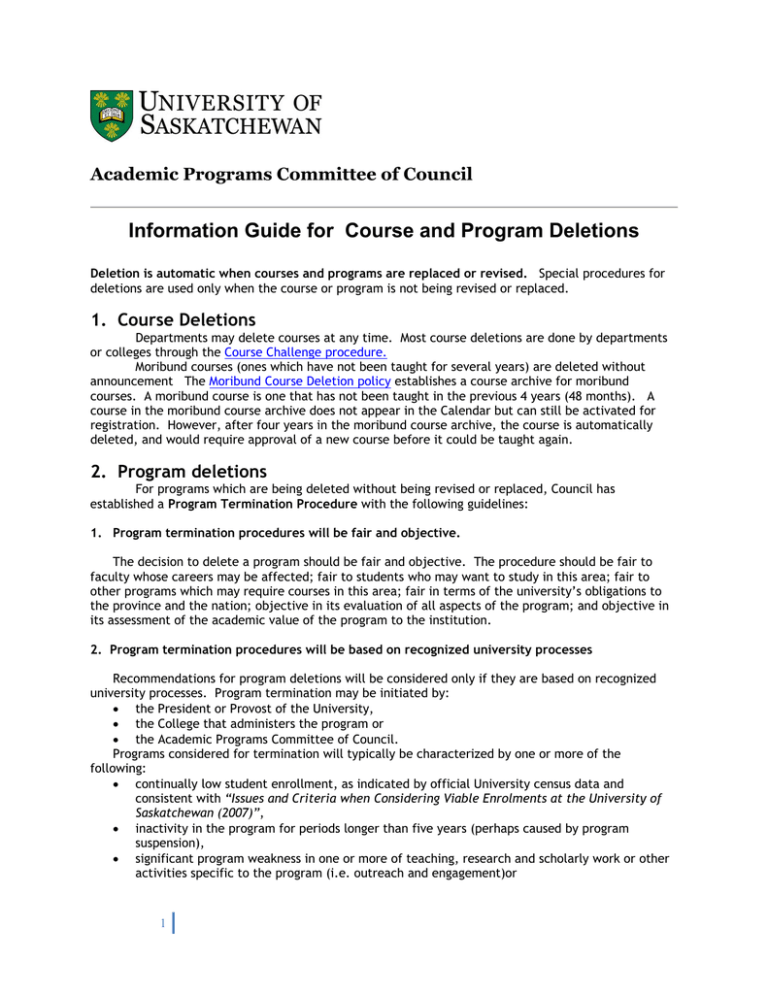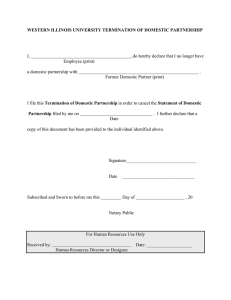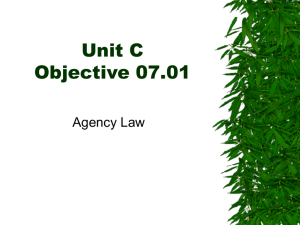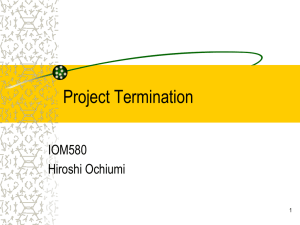Information Guide for Course and Program Deletions
advertisement

Academic Programs Committee of Council Information Guide for Course and Program Deletions Deletion is automatic when courses and programs are replaced or revised. Special procedures for deletions are used only when the course or program is not being revised or replaced. 1. Course Deletions Departments may delete courses at any time. Most course deletions are done by departments or colleges through the Course Challenge procedure. Moribund courses (ones which have not been taught for several years) are deleted without announcement The Moribund Course Deletion policy establishes a course archive for moribund courses. A moribund course is one that has not been taught in the previous 4 years (48 months). A course in the moribund course archive does not appear in the Calendar but can still be activated for registration. However, after four years in the moribund course archive, the course is automatically deleted, and would require approval of a new course before it could be taught again. 2. Program deletions For programs which are being deleted without being revised or replaced, Council has established a Program Termination Procedure with the following guidelines: 1. Program termination procedures will be fair and objective. The decision to delete a program should be fair and objective. The procedure should be fair to faculty whose careers may be affected; fair to students who may want to study in this area; fair to other programs which may require courses in this area; fair in terms of the university’s obligations to the province and the nation; objective in its evaluation of all aspects of the program; and objective in its assessment of the academic value of the program to the institution. 2. Program termination procedures will be based on recognized university processes Recommendations for program deletions will be considered only if they are based on recognized university processes. Program termination may be initiated by: • the President or Provost of the University, • the College that administers the program or • the Academic Programs Committee of Council. Programs considered for termination will typically be characterized by one or more of the following: • continually low student enrollment, as indicated by official University census data and consistent with “Issues and Criteria when Considering Viable Enrolments at the University of Saskatchewan (2007)”, • inactivity in the program for periods longer than five years (perhaps caused by program suspension), • significant program weakness in one or more of teaching, research and scholarly work or other activities specific to the program (i.e. outreach and engagement)or 1 • persistent lack of necessary resources (staff, faculty or finances) or inefficient use of available resources. 3. Program termination procedures will be limited to programs. For the purpose of program termination, a program is a generally defined set of courses to be taken by a student to obtain a specific academic outcome, such as a degree, certificate, diploma, or other recognized qualification. A program (for example, History, Biology, Nursing, etc.) may be offered at various Levels of Concentration (minor, major, honours in undergraduate programs; thesis and nonthesis in graduate programs). The programs covered by the Program Termination Procedure are those at the undergraduate (major, honours) and graduate (discipline) levels, related to the Fields of Specialization (see list attached). Deletion of other types of academic offerings, such as minors, options, certificates of successful completion, and certificates of attendance, are handled through the same process as used for approval for that type of program: options by Academic Programs Committee (APC), minors by Course Challenge; certificates of completion by the Provost & Vice President Academic, certificates of attendance by Deans. Determinations about department mergers or program replacements will be made by the APC when it reviews proposals for such changes and only as they relate to programs as described above. 4. Program termination procedures require submission of the Report Form for Program Termination, review by the Academic Programs Committee, and approval by Council. The Report Form (Attachment II) must be completed and submitted to the APC by either the President/Provost of the University or the home college for the program under consideration. The term “home college” refers to the college that holds administrative responsibility for the academic program. The College of Graduate Studies and Research is the home college for all graduate programs. The APC will review the recommendation, following the process described in section IV of this document, and if there is merit, will formulate a recommendation for consideration by Council. Council will discuss the program termination on the basis of recommendations forwarded by the Academic Programs Committee. Council has the ultimate authority to make the final determination. Process for Program Termination As described above, and illustrated in Figure 1, the process for program termination may be initiated by the President/Provost of the University, the college that administers the program or the Academic Programs Committee of Council. When program termination procedures are initiated by the President/Provost or the home college, a proposal to terminate the program will be submitted to the Academic Programs Committee of Council. The “Report Form for Program Termination” (attachment II) will form the basis of the documentation submitted. A decision by a college to recommend program termination will have been approved by respective program committees within the college. The APC may initiate program termination procedures, based on results from formal University review processes. The APC will recommend that either or both the President/Provost or home college examine the quality and viability of a specific program and confirm their commitment to the program. The outcome from such an examination may be to propose to the APC that the program be terminated. The “Report Form for Program Termination” (attachment II) will form the basis of the documentation submitted in such a case. As in the case above, a decision by a college to recommend program termination will have been approved by respective program committees within the college. 2 Regardless of the origin of the proposal to terminate a program or how the process was initiated, the same process will be used. Keeping the principles listed above in mind, the APC will consider the following issues: a) the academic value of this program to the University, b) the quality assessment achieved by this program in any recent formal review process, c) the impact of termination on undergraduate and graduate students and how they will be advised to complete their programs, d) the impact of program termination on faculty and staff, including the implications of provisions of collective agreements, e) the impact of termination on any ongoing research projects or the overall research capacity and reputation of the University, f) any financial and/or resource impacts, including faculty, staff, physical facilities and equipment, library resources, disposition and archiving of materials, termination of trust funds, impact on development or alumni projects, g) the impact of termination on other programs, departments or colleges, and in particular whether related programs will be affected by this termination, where areas of consideration would include: quality, demand, efficiency, unique features, relevance to the province, whether this program is already available from another college or department, whether course terminations will affect any other programs, if there is any impact on internal or external partners in interdisciplinary programs, and whether it is likely, or appropriate, that another department or college will develop a program or courses to replace the ones deleted, h) any external impact from the termination (university reputation, accreditation, other institutions, high schools, community organizations, professional associations, etc.), including whether it is likely or appropriate that another educational institution will offer this program if it is deleted at the University of Saskatchewan and i) the impact of the termination on areas such as extension and public service, education equity, interdisciplinarity, the university mission and goals. In the process of considering the above-noted issues, the APC will ensure that all relevant factors are considered, and that all interested parties have had the opportunity to make written and/or oral submissions to APC. If the APC concludes that the program should be terminated, the APC will make this recommendation to University Council. The proposal to terminate the program submitted to the APC will be the basis of the information that the APC submits to University Council. The recommendation to University Council would also include a synopsis of APC’s discussions and conclusions. May, 2008 NOTE: The Academic Programs Committee updated the Program Termination Procedures in March, 2009 to add a requirement for covering memos from the Department and from the College relating to their review of the program termination. 3 List of Fields of Specializations at the University of Saskatchewan as of January, 2008 The programs covered by the Program Termination Procedure are those related to the Fields of Specialization at the undergraduate (major, honours) and graduate (discipline) level listed below. Deletion of other types of program offerings, such as minors, options, certificates of successful completion, and certificates of attendance, are handled through the same process as was used for approval for that type of program: options by Academic Programs Committee, minors by Course Challenge; certificates of completion by the Provost & Vice President Academic, certificates of attendance by Dean. Aboriginal public administration Accounting Agribusiness Agribusiness management Agricultural and bioresource engineering Agricultural biology Agricultural economics Agronomy Anatomy and cell biology Animal and poultry science Animal science Anthropology Applied microbiology Archaeology Art and art history Art history Biochemistry Biochemistry and biotechnology Bioinformatics Biological psychiatry Biology Biology and biotechnology Biomedical engineering Biomolecular structure studies Biotechnology Biotechnology management Business economics Cell biology and biotechnology Chemical engineering Chemistry Civil engineering Civil and geological engineering Classical and near eastern archeology Classical, mediaeval and renaissance studies Community health and epidemiology Composition Computer engineering Computer science Computing Continuing education Curriculum studies Dentistry Drama Economics Education 4 Educational administration Educational foundations Educational psychology and special education Electrical engineering Engineering physics English Environmental earth sciences Environmental engineering Environmental science Exercise and sport studies Finance Finance and management Food and applied microbiological sciences Food science French Geography Geological engineering Geological sciences Geology Geophysics German Health services management History Human resource management Indigenous management Indigenous peoples and justice Individualized interdisciplinary graduate programs International business management International studies International trade Kinesiology Land use and environmental studies Languages and comparative literature Languages and linguistics Large animal clinical sciences Law Linguistics Management Marketing Mathematical physics Mathematics Mathematics and statistics Mechanical engineering Medicine Microbiology Microbiology and biotechnology Microbiology and immunology Music Music education Musicology Music theory Native studies Northern studies Nursing Nutrition Obstetrics and gynecology Operations management Palaeobiology Pathology Pediatrics Pharmacology Pharmacy Philosophy Physical education studies Physical therapy Physics Physics and engineering physics Physiology Plant ecology Plant science Plant sciences Political studies Prairie studies Psychology Public administration Public health Regional and urban development Religious studies Rural resource management Russian School and counselling psychology Small animal clinical sciences Sociology Sociology of biotechnology Soil science Spanish Statistics Studio art Surgery Toxicology Ukrainian Vaccinology and immunotherapeutics Veterinary biomedical science Veterinary microbiology Veterinary medicine Veterinary pathology Women's and gender studies Website for list of Fields of Specialization: www.usask.ca/university_secretary/programs/s pecialization.php 5 President/Provost Proposal to terminate program College Recommendation to examine program APC Proposal to terminate program Results from formal University review processes Recommendation to terminate program University Council (decision) Figure 1. Flowchart of process for program termination. 6 Report Form for Program Termination Department: Program(s) to be deleted: Effective date of termination: College: 1. List reasons for termination and describe the background leading to this decision. 2. Technical information. 2.1 Courses offered in the program and faculty resources required for these courses. 2.2 Other resources (staff, technology, physical resources, etc) used for this program. 2.3 Courses to be deleted, if any. 2.4 Number of students presently enrolled. 2.5 Number of students enrolled and graduated over the last five years. 3. Impact of the termination. Internal 3.1 What if any impact will this termination have on undergraduate and graduate students? How will they be advised to complete their programs? 3.2 What impact will this termination have on faculty and teaching assignments? 3.3 Will this termination affect other programs, departments or colleges? 3.4 If courses are also to be deleted, will these deletions affect any other programs? 3.5 Is it likely, or appropriate, that another department or college will develop a program to replace this one? 3.6 Is it likely, or appropriate, that another department or college will develop courses to replace the ones deleted? 3.7 Describe any impact on research projects. 3.8 Will this deletion affect resource areas such as library resources, physical facilities, and information technology? 3.9 Describe the budgetary implications of this deletion. External 3.10 Describe any external impact (e.g. university reputation, accreditation, other institutions, high schools, community organizations, professional bodies). 3.11 Is it likely or appropriate that another educational institution will offer this program if it is deleted at the University of Saskatchewan? Other 3.12 Are there any other relevant impacts or considerations? 3.13 Please provide any statements or opinions received about this termination. (Optional) 4. Additional information. Programs which have not undergone recent formal reviews should provide additional relevant information about quality, demand, efficiency, unique features, and relevance to the province. 5. Attachments. Please attach memos from the Department and College regarding this termination. 7



